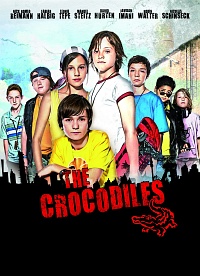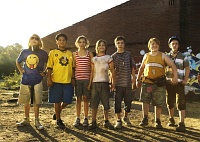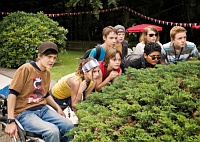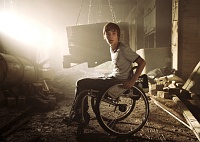“Social backgrounds don’t matter for a child – friendship does”
 In 1977 the book ‘Vorstadtkrokodile’ by Max von der Grün was adapted into a popular TV-film. Now Christian Ditter did a remake for the big screen. THE CROCODILES still carries along the heritage of the late seventies: the film’s perspective on ethnic minorities, disabled children, parenthood, etc. needed to be updated. THE CROCODILES can be considered an interesting case study in group’s dynamics: a bunch of children with different social backgrounds brought together in one gang in the suburbs of a German town.
In 1977 the book ‘Vorstadtkrokodile’ by Max von der Grün was adapted into a popular TV-film. Now Christian Ditter did a remake for the big screen. THE CROCODILES still carries along the heritage of the late seventies: the film’s perspective on ethnic minorities, disabled children, parenthood, etc. needed to be updated. THE CROCODILES can be considered an interesting case study in group’s dynamics: a bunch of children with different social backgrounds brought together in one gang in the suburbs of a German town.
It’s Hannes’ big dream to become a member of The Crocodiles, the coolest gang in town. Kai too shares the same dream but for him things aren’t so obvious since he is disabled, wheeling round in his wheelchair. One night Kai witnesses a burglary. Suddenly, the gang is interested in him after all. With Kai’s help and a shot of Crocodile courage, the whole gang sets about cracking the case…
 THE CROCODILES tickles the audience’s senses with a thrilling story, some spectacular scenes (this is no movie for people suffering from fear of heights), a wheelchair chase and a vibrant and positive view on life in suburbia.
THE CROCODILES tickles the audience’s senses with a thrilling story, some spectacular scenes (this is no movie for people suffering from fear of heights), a wheelchair chase and a vibrant and positive view on life in suburbia.
Christian Ditter: “I grew up in a suburb. In suburbia all your friends live close to you, you can easily meet each other, you can go everywhere by bike and you don’t need your parents to drive you. As a kid it makes you quite independent. And in suburbia everybody knows each other. Whatever happens – even if it’s a crime like in THE CROCODILES – chances are real that you know the people who are involved in it.”
Can the children of today easily identify with these characters?
Ditter: “In THE CROCODILES every gang member has very different characteristics. I hope every child of today finds someone to identify with: the leader, the foreign kid, the only girl, the fat boy, the disabled one, the stutterer or the small boy. Individually they would all be outsiders but together they are the coolest gang in town. Social backgrounds don’t matter for a child – friendship does. I accentuated their different backgrounds, but as friends they share the same world.”
 To an entire generation the original THE CROCODILES is a strong cinematographic memory. Were you at any time aware of that?
To an entire generation the original THE CROCODILES is a strong cinematographic memory. Were you at any time aware of that?
Ditter: “For a long time it was one of my favourite films too, as a child. But our version was always intended to be an adaptation of the novel for today’s children who cannot identify with a 30 year old version any more. We didn’t try to live up to the old film, we tried to tell the story again from scratch.”
Some of the ideas and concepts from the seventies you had to transmit in a trustworthy way to a more modern setting.
Ditter: “Friendship, courage, loyalty and love are relevant to everybody, no matter how old you are or where you live. All the themes of the novel are still relevant in today’s society. We kept the themes, but changed the angle of exploring them. In the seventies’ version minorities were portrayed as ‘foreigners’. Even The Crocodiles were portrayed as a gang, not so much as individuals. That’s why we made every child special in it’s own way and we included a Greek boy.”
 On the technical level, the film had some interesting challenges for you. How did you handle the scenes above upon the roof?
On the technical level, the film had some interesting challenges for you. How did you handle the scenes above upon the roof?
Ditter: “We build a roof which was only a few meters above the ground and we pointed the camera towards the sky as possible as much. We did some shots looking down into the depth. We used a green screen and later added the “depth”. The most spectacular stunt was Hannes sliding from the roof. It wasn’t as high as it looks, but still high enough to fall down. We had big boxes piled up below our actor Nick Reimann, but if he fell he could still hurt himself badly. He insisted not to be doubled and to slide down the roof, grab the drainage and hang on to it in one shot. Everybody was very impressed.”
Was it really an old factory? And did you really blow it up in the end?
Ditter: “Yes, it was. But we didn’t blow it up. It was much cheaper to use a visual effect.”
 Who’s the boy playing Kai’s role? Who could train him in riding his wheelchair?
Who’s the boy playing Kai’s role? Who could train him in riding his wheelchair?
Ditter: “Fabian Halbig is the drummer in a young punk rock band. We had him trained by a doctor who usually trains people who got disabled after an accident. For the scene with the high-speed wheelchair we had a stunt man from Las Vegas who could do everything with a wheelchair you could possibly imagine (and more!) and had him double Fabi. We shot the close-ups of Fabi while pulling him along behind the camera car. We edited the scene so speedy that the audience doesn’t have the time to notice it’s two different people!”
The film was pretty well received in Germany. Where you pleased with the result?
Ditter: “We received so many letters from children who had seen the film over and over again, and that’s the most rewarding experience: creating someone’s new favourite film.”
 The main theme of the film could be: ‘believe in yourself and know what you’re good at’. Do you know what you’re good at?
The main theme of the film could be: ‘believe in yourself and know what you’re good at’. Do you know what you’re good at?
Ditter: “Everything I do I try to do it with passion and to my best abilities. Whether that’s good enough or not you’ll have to see at the movies!”
Plans for a CROCODILES-sequel are getting concrete. Production support has been applied for already. Christian Ditter once more will be the director.
Gert Hermans
